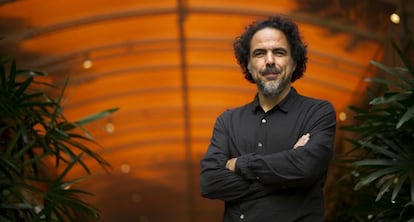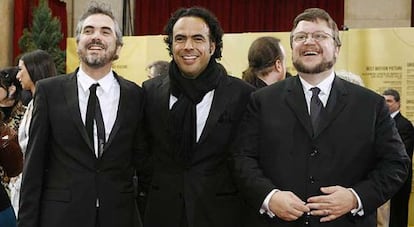Where have the Hispanic Oscar nominees gone?
Director Alejandro González Iñárritu is in the running, but no Latino actors on this year’s list

“The Mexican cartel has taken over,” cries Alejandro González Iñárritu with the same sharp humor that’s on display in his latest movie, Birdman.
“They’ve bought off the festivals, the critics, and now Hollywood as well,” he adds, as though that explained all his nods for this Sunday’s Academy Awards, where Birdman is the most-nominated film alongside The Grand Budapest Hotel, both of which are up for nine trophies.
Iñárritu himself is in the running for Best Picture, Best Director and Best Original Screenplay, which he co-wrote with Argentineans Nicolás Giacobone and Armando Bo and Armenian Alexander Dinelaris.
Only two percent of the Academy’s 6,000-plus members are Hispanic
“Nothing could scream out New York more than our language mix – we had arguments in Spanish and English and wrote in bilingual mode, or else in Spanglish,” says the 51-year-old creator of Biutiful and Amores perros.
While this particular edition of the world’s best-known movie awards has been criticized for its lack of diversity, Birdman brings back memories of 2007, a glory year in which “The Three Amigos” – Mexican directors Alejandro González Iñarritu, Guillermo del Toro and Alfonso Cuarón – ruled the Oscars with a combined 18 nominations.
This time round Iñarritu is joined by his compatriots and Birdman colleagues Emmanuel Lubezki (Best Cinematography) and Martín Hernández (Best Sound Editing) and, in the short documentary category, Mexico’s The Reaper. As for Best Foreign-Language Film, the Hispanic world is represented by Spanish-Argentinean co-production Wild Tales.

But as Guillermo del Toro notes, despite their shared birthplace, the trio were all raised on “Japanese manga, Hollywood movies and European literature,” meaning that the term “Hispanic” is simply a way to set these directors apart.
“There are always people who want to put a name tag on what is nothing more than a coincidence,” notes Iñárritu in a more serious tone.
While recognizing his fellow Mexicans’ talent and underscoring Mexican cinema’s “great moment,” he would rather not make any more of it.
Or like the actor and producer Edward James Olmos once said, Hispanics are there to be talked about, not to be taken into account.
Film director Alejandro González Iñárritu
The Wrap, an online publication covering entertainment news, reported that Hispanics “bought 25 percent of [US movie] tickets sold in 2013 though they comprise just 17 percent of the population, according to the Motion Picture Association of America’s year-end study.”
Yet they only appear in 4.9 percent of roles in Hollywood productions, while only two percent of the Academy’s 6,000-plus members are Hispanics.
Last year, Alfonso Cuarón became the first Hispanic filmmaker to win the Best Director Oscar, for Gravity. “He is the grandfather,” jokes González Iñárritu about the eldest of “The Three Amigos,” who is 53.
But this time round the complete absence of a Spanish-sounding surname among the acting nominees has been much bemoaned, after a run of 15 years that has seen the likes of Javier Bardem, Salma Hayek, Benicio del Toro, Adriana Barraza, Demian Bichir, Penélope Cruz and Catalina Sandino Moreno all given nods.
Like the comedian Chris Rock asked in an open letter published in The Hollywood Reporter: “Is Hollywood Mexican enough? […] You’re telling me no Mexicans are qualified to do anything at a studio? Really? Nothing but mop up? What are the odds that that’s true? ”
Tu suscripción se está usando en otro dispositivo
¿Quieres añadir otro usuario a tu suscripción?
Si continúas leyendo en este dispositivo, no se podrá leer en el otro.
FlechaTu suscripción se está usando en otro dispositivo y solo puedes acceder a EL PAÍS desde un dispositivo a la vez.
Si quieres compartir tu cuenta, cambia tu suscripción a la modalidad Premium, así podrás añadir otro usuario. Cada uno accederá con su propia cuenta de email, lo que os permitirá personalizar vuestra experiencia en EL PAÍS.
¿Tienes una suscripción de empresa? Accede aquí para contratar más cuentas.
En el caso de no saber quién está usando tu cuenta, te recomendamos cambiar tu contraseña aquí.
Si decides continuar compartiendo tu cuenta, este mensaje se mostrará en tu dispositivo y en el de la otra persona que está usando tu cuenta de forma indefinida, afectando a tu experiencia de lectura. Puedes consultar aquí los términos y condiciones de la suscripción digital.








































